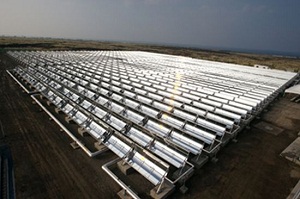Hawaiian Mini-CSP manufacturer earns certification for mainland growth
 A Hawaiian manufacturer of mini-concentrated solar power recently received a certification from the Solar Rating and Certification Corporation that will allow it to grow its mainland business.
A Hawaiian manufacturer of mini-concentrated solar power recently received a certification from the Solar Rating and Certification Corporation that will allow it to grow its mainland business.
Sopogy manufactures smaller CSP troughs, mirrors that concentrate the sun’s power, heating liquid in containers at their center to power air conditioning, heating and power generation cogs.
The technology’s larger and better-known brother, CSP, uses massive 40-foot mirrors and is typically employed in the biggest projects—the utility-scale power generation farms with more than 50 megawatts, said Sopogy CEO Darren T. Kimura.
Using smaller mirrors and equipment, Sopogy’s mini-CSP technology is a little more cost effective for projects that aren’t designed to power thousands of homes.
“We go after projects that are 5 to 50-megawatt,” Kimura said. “That’s where we’re strongest.”
He said that his technology has been popular on the islands of Hawaii where power is expensive and there’s a strong draw toward solar.
His system isn’t always the right answer, especially not for small projects where traditional photovoltaic solar panels are best, but is right in most systems between 5 and 50 megawatts, Kimura said.
He explained the metrics. A traditional 10-megawatt PV system might produce 1,800 megawatt hours a year. At a payout of 15 cents per watt, the system would generate $2.7 million a year. But it would have cost, at $3.50 per watt, $35 million to develop. That’s a 13-year payback.
Sopogy’s CSP technology stores the sun’s energy so it can continue producing power even after the sun sets or gets clouded over, Kimura said. That means an 8-megawatt system could produce 2,700 megawatt hours to the traditional PV’s 1,800. That generates $3.2 million a year in revenue and pays for the system, which cost about $1 million less than standard PV, in 10 years instead of 13.
“That’s how we win,” Kimura said.
And now, with SRCC certification, Sopogy aims to win in states like Arizona and California where the certification is now required before the utility companies will approve grid-tying systems.
The certifications are new, and as more and more come online, it’s a good indication of the solar industry’s maturity, Kimura said.
“It offers good protection for the customer,” he said.
Image courtesy of Sopogy.



